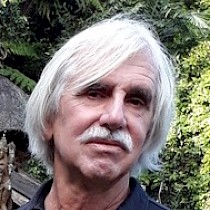Professor J. Stephen Lansing

J. Stephen Lansing is an external professor at the Complexity Science Hub Vienna and the Santa Fe Institute, and emeritus professor of anthropology at the University of Arizona. From 2015 to 2019 he was Director of the Complexity Institute and Professor in the Asian School of Environment at Nanyang Technological University in Singapore. He has been a Fellow at the Institute for Advanced Study at Princeton, the Center for Advanced Study in the Behavioral Sciences at Stanford, the Institute of Advanced Study at Durham University and the Stockholm Resilience Center. His research on Balinese water temples was the basis for Bali’s UNESCO World Heritage Cultural Landscape in 2012, and the focus of an exhibition by a team of architects, artists and researchers from ETH Zurich at the Sharjah Architecture Triennial, "the rights of future generations." His most recent book is Islands of Order: A Guide to Complexity Modeling for the Social Sciences (Princeton University Press 2019) and companion website https://www.islandsoforder.com.
Synopsis
Steering capacity for navigating planetary boundaries:
evolutionary perspectives and strategic opportunities
Steve Lansing
Today, as Greta Thunberg reminds us, there is consensus among natural scientists that the catastrophic environmental tipping points we anticipate in the near future are avoidable. But scientists are strangely silent on the question of whether our governance institutions are up to the job. Recent studies show that slowdowns in a dozen highly concentrated industries, all of which are easily monitored, could rapidly restore the safety margin for the biosphere. If such changes are essential, perhaps the correct question is not ``can we afford to make them?" but rather ``is there a believable roadmap to achieve them in the time available to us?"
Researchers have learned that when very rapid evolutionary transitions occur they are often conservative, building on minimal changes to existing adaptations. To explain how this is possible, biologists refer to the “adjacent possible”: new solutions to a problem of adaptation that can easily be reached. Is there an adjacent possible for managing the global commons? We need a global institution that could take responsibility for setting gold standards of critical care for planetary health, the global commons. A global academy of science is the optimal solution because it would have the necessary scientific competence and legitimacy. Bringing it into existence would not require new treaties or regulations, nor would it challenge national or corporate sovereignty. Instead, the prospect of a gold standard of care to reduce the risk of global catastrophes like the spread of covid would lift a burden of anxiety from corporations, governments and people.
All Speakers
- Refik Anadol
- Thorsten Bauer
- Prof. Stefanie Betz
- Prof. Ina Conradi Chavez
- Mark Chavez
- Florian Dohmann
- Dan Haab
- Dr. Lily Hibberd
- Prof. Jeroen van den Hoven
- Professor J. Stephen Lansing
- Mathew Lawrence
- Prof. Jason Edward Lewis
- Roman Lipski
- Dr. Sebastian Meier
- Prof. Galina Mihaleva
- Dave Murray-Rust
- Prof. Dr. Dr.-Ing. Jivka Ovtcharova
- Gülsel Özkan
- Dr. phil. Dipl.-Ing. Oliver Parodi
- Ludger Pfanz
- Thea Riofrancos
- Dr. Matthias Röder
- Seda Röder
- Prof. David Rolnick
- Prof. Rasa Smite
- Dr. Christoph Schneider
- Dr. Markus Schmidt
- Kathleen Schröter
- Prof. Vibeke Sorensen
- Holger Volland
- Prof. Victoria Vesna
- Prof. Charles Wang
- Yulu Wang
- Daniel Walther
- Prof. Dr. Steffen P. Walz
- Pawel Wargan
- Elizabeth Wathuti
- Prof. Dr. Marion Weissenberger-Eibl
- Wang Zhigang PH.D
Contact
Interesse? Fragen?
Schreiben Sie uns:
info@beyond-festival.com




